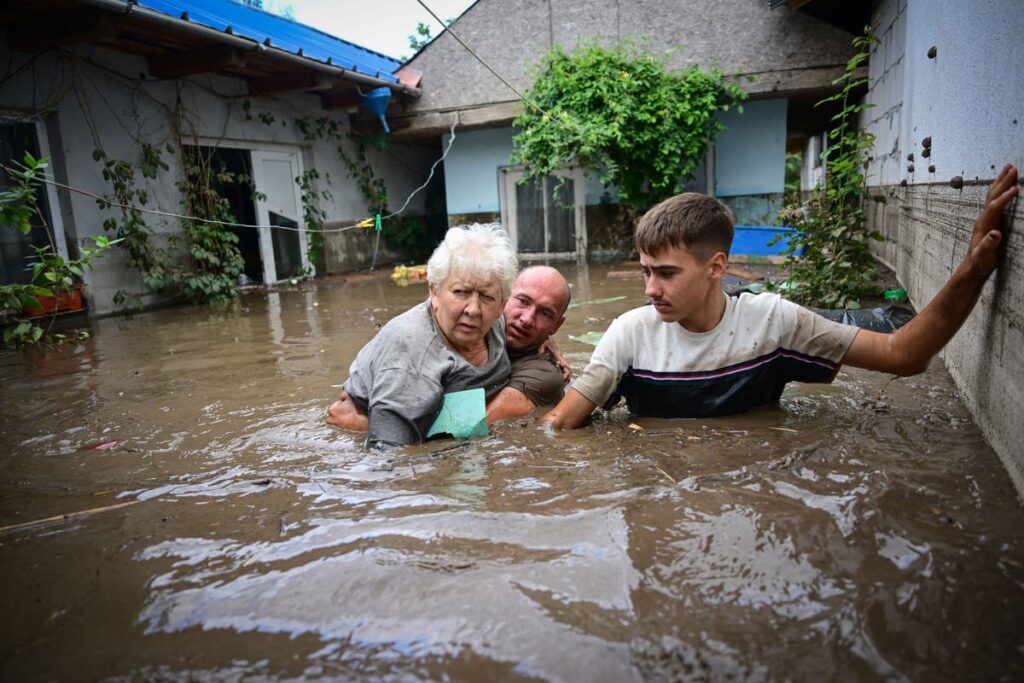Chart shows rising intensity of rainfall in Europe due to storms like Boris (World Weather Attribution)
The flooding from Boris devastated many parts of Poland, Austria, Slovakia, Romania, and Czechia, with some of the worst impact felt in urban areas along major rivers.
Videos showed dramatic rescue operations involving helicopters, people carrying elders and children through waist-deep water, and people waiting on their roofs as their houses got submerged.
Towns along the Polish-Czech border were particularly hard hit, and Vienna saw parts of the city submerged as the Danube river overflowed. Some areas experienced five times the average September rainfall as authorities scrambled to evacuate people and erect flood defences.
In Poland alone, thousands of homes were damaged and major infrastructure such as roads and bridges was swept away by the floodwaters. The storm has broken 12 dams, leading to widespread flooding.
Power outages forced schools, factories and hospitals to shut temporarily. Meanwhile, in Romania’s eastern regions, entire neighbourhoods were submerged and emergency crews were stretched to their limits.
“Even with days of preparation, floodwaters still devastated towns, destroyed thousands of homes, and saw the European Union pledge €10 billion in aid,” Maja Vahlberg, a technical advisor with the Red Cross Red Crescent Climate Centre, said.
“Countries need to plan for unprecedented floods and integrate climate change into land-use planning.”
The new study suggests that while the number of Vb depressions – the weather system responsible for these floods – has remained consistent since the 1950s, the intensity of rainfall events has increased due to warmer air and ocean temperatures in the region.
“The 1997 and 2002 floods in central Europe were described as once-in-a-century events, but two decades later, global warming has increased from 0.5 to 1.3C, and they have happened again,” Dr Bogdan H Chojnicki, climatologist at Poznań University, said.
“The trend is clear – if humans keep filling the atmosphere with fossil fuel emissions, the situation will be more severe.”
While Europe has advanced greatly in forecasting and emergency planning since those floods around the turn of the century, experts say more needs to be done to be able to cope with the increasing challenge of disasters. Europe is also the fastest warming continent due to the climate crisis.
Researchers say there’s a need for better floodplain storage, improved warning systems, and more resilient infrastructure. But most importantly, the report stresses the need for stronger climate action to reduce the risks of future disasters.
“Crippling droughts in southern Italy. Devastating wildfires in Portugal. Killer floods in Central Europe… climate change is wreaking havoc in Europe but politicians across the continent are trying to pull back on climate commitments,” said Friederike Otto, senior lecturer in climate science at Imperial College London.
“Climate change is an existential threat, especially for poorer parts of society. Europeans need to know that tackling it will make their lives so much better.”
The cost of inaction will be measured not only in lives lost but also in the economic toll these disasters take, experts say.
The €10 billion pledged by the European Union for repairs following Storm Boris may just be the tip of the iceberg if global temperatures rise further.
“Climate models and physics show us that these types of intense downpours are getting more frequent and more intense as the world warms,” said professor Hannah Cloke from the University of Reading.
“This should spur action to prepare for weather events that could happen at any time, as well as reducing the emissions that are contributing to their intensity.”
Source link : http://www.bing.com/news/apiclick.aspx?ref=FexRss&aid=&tid=66f4201870c6472eb1828fcbcc245938&url=https%3A%2F%2Fwww.independent.co.uk%2Fnews%2Fworld%2Feurope%2Feurope-flooding-storm-boris-poland-austria-climate-change-b2618665.html&c=12268475908155910352&mkt=de-de
Author :
Publish date : 2024-09-25 02:42:00
Copyright for syndicated content belongs to the linked Source.
